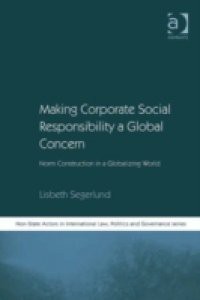In recent decades, claims have increasingly been made on transnational corporations to take responsibility for the promotion and protection of human and labour rights in countries where they operate. This behavioural obligation results from the persistent advocacy of non-governmental organizations and is commonly known as corporate social responsibility (CSR).Driven by the theory of the 'norm life cycle model', the book uses an interesting range of case studies, including Nike and the anti-apartheid movement, to trace the development of CSR as an international norm. The development is examined through five selected non-governmental organizations: Clean Clothes Campaign, Fairtrade Labelling Organizations International, Global Exchange, International Business Leaders Forum and the International Labor Rights Fund. The book makes a lucid contribution to an emerging scholarship, and will interest researchers and practitioners involved in issues of global governance and global civil society.



















